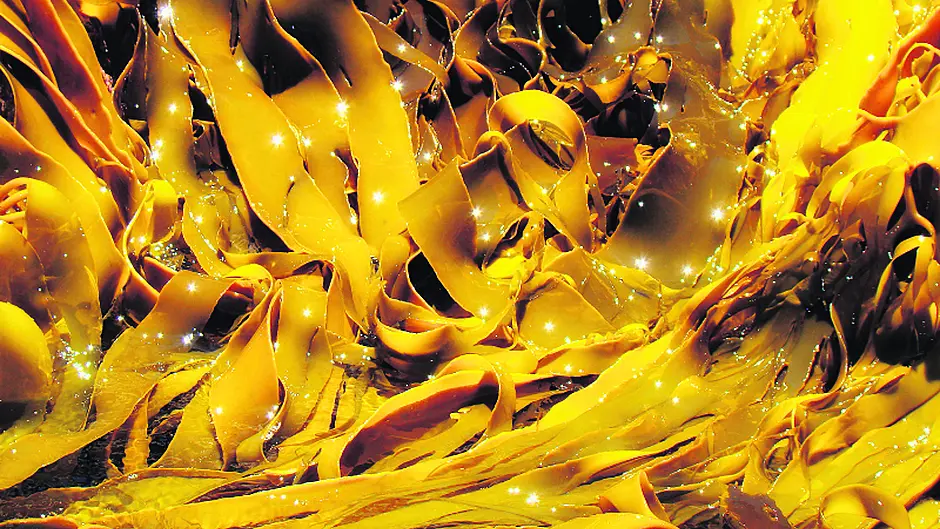Seaweeds have historically been an important resource on the island of Ireland, but until recent years their myriad health benefits have been overlooked.
‘God created seaweed...the seaweed made the world.’
John B Keane
Seaweeds, or sea vegetables as some prefer to call them, have historically been an important resource on the island of Ireland, but until recent years their myriad health benefits have been overlooked. As 2016 ushers in a renewed focus on eating nutrient dense plant foods, these little powerhouses of goodness are really coming into their own.
All life came from the sea, and seaweed contains pretty much all of the macro and micro nutrients that are needed to support it: protein and fibre, vitamins A (betacarotene), B, C, E, K and folate, calcium, magnesium, potassium, sodium, iron, selenium, zinc, iodine, copper, manganese and phosphorous. It also carries unique plant chemicals that help to burn fat, reduce the absorption of dietary fats and sugar, and regulate insulin, thereby aiding weight loss and helping to prevent diabetes. Other phytochemicals stimulate the excretion of toxins like heavy metals, kill cancer cells or inhibit their ‘signalling’ and growth, boost digestive health and levels of good gut bacteria, and regulate hormones; glutamic acid provides the savoury ‘umami’ taste. A variety called wakame also contains essential omega-3 fatty acids. Adding kelp to pulses while cooking will aid their digestion, and any variety will enhance the nutritional status of the food it’s cooked with.
This stellar nutritional line up translates into almost too many health benefits to list, but many of them are related to the probiotic and anti-inflammatory action of seaweeds. As we know now, a poor gut bacteria profile and chronic inflammation are at the root not just of arthritis and skin disorders, allergic conditions and inflammatory bowel diseases, but also obesity and diabetes, heart disease and stroke, osteoporosis, some cancers, dementia, depression, recurrent infections and autoimmune issues like rheumatoid arthritis and hypothyroidism, peptic ulcers, cystitis, sinusitis, gum disease and more. Eating tiny amounts of seaweed on a regular basis will also help to prevent hormonal cancers like breast and prostate cancer, some cases of infertility, PMS, menopausal symptoms, skin conditions including acne, rosacea, psoriasis and eczema, and premature ageing.
Seaweeds are of course consumed in such small doses that you might think their nutritional hit would be negligible, but unlike the soil used in commercial farming the sea is not depleted of minerals and in some cases the nutrients in the vegetables of the sea can be highly concentrated. One of their most precious gifts would be high levels of iodine, which is vital for normal thyroid function. It’s now estimated that around 10% of people suffer from hypothyroidism—and funnily enough that 10% of us are iodine deficient, largely because of fluoride in the water, which interferes with its absorption-- though many more go undiagnosed. See your GP if you experience unexplained fatigue and weight gain along with coldness, depression, constipation, hair loss or fertility problems (pregnant women should always ask to be tested for both iodine and thyroid hormone levels as they’re crucial for normal foetal development.). If your levels of thyroid hormone are borderline low you would benefit greatly from including seaweed in your diet, but so powerful are these plants that you should stick to those small amounts if you are on medication for the condition. For all of us, just using it as a condiment three or four times a week, or as a salad once a week is plenty.
You can now find seaweeds, both as flakes and larger pieces, in supermarkets such as Supervalu. The flakes are very easy to use and make an excellent salt replacement, but again go easy, and read the label--one brand I found needs to be soaked if it’s not to be cooked. Once you get used to the idea, there are really no limits to seaweed’s uses: salads, soups and stews, stir fries, sushi, spreads, sauces and dips like seaweed butter, hummus and pesto, roasted in tamari and sesame oil as crisps, added to risotto, omelettes or just greens. Queen of the seaweeds Dr Prannie Rhatigan says that when sea vegetables are eaten with land vegetables the nutritional profile of both is enhanced.
• For more information and recipes see Prannie Rhatigan’s Irish Seaweed Kitchen, or Sally McKenna’s Extreme Greens: Understanding Seaweeds.






